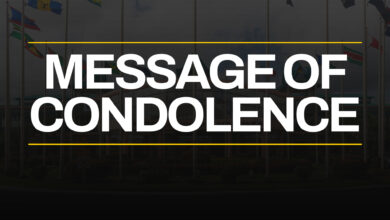In this era of increasing trade liberalisation the Caribbean is being increasingly regarded as an area of great significance . This point was underscored by the Region’s Chief Negotiator, Sir Shridat Ramphal. His comments came as he opened the Second Special Meeting of the Council for Trade and Economic Development (COTED) on the Regional Negotiating Machinery (RNM) on 9 September 1999 at the Headquarters of the CARICOM Secretariat, Georgetown, Guyana.
Sir Shridat emphasised that over the past two years the Region has been working as one in addressing external trade issues. He stressed that the increasing profile of the Region in trade negotiations is a positive sign and that the biggest asset that the Region brings to the process is its human resources.
The Chief Negotiator said that throughout the series of external negotiations there had been a unified voice by the Region. He added that the Regional leaders have always stated that the Region must move forward as one, and it speaks volumes for the Region that this continues to be the case. He added too that through the RMN, the Caribbean has been able to harmonise its differences towards a common goal.
Sir Shridat added that the road ahead would be tough for the Region and there would be challenges. He emphasised that the world is not out there to look after us, rather the Caribbean must look after itself.
“We have to carve out a niche for ourselves requiring the world to recognise that we are special and that we need differential treatment,” Sir Shridath stressed. He added that as small developing states the Caribbean must have special treatment in the global trade context.
The Special Meeting of COTED on RNM matters concludes with the Ministerial Meeting on Saturday 11 September 1999. The Meeting comes on the heels of the upcoming series of meetings on regional and international trade issues. All of these meetings are a lead-up to the next round or continuation of trade negotiations in various fora such as the Free Trade Area of the Americas (FTAA) and the World Trade Organisation (WTO).





